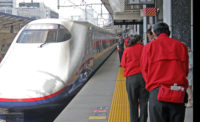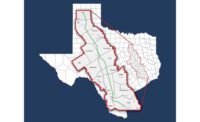The California High-Speed Rail Authority has a March 5 deadline to respond to the U.S. Dept. of Transportation’s threat to cancel $929 million in federal grant money for its planned Los Angeles-Bay Area line.
In a Feb. 19 statement, the U.S. DOT also stated that it is " actively exploring every legal option to seek the return from California of $2.5 billion in federal funds FRA previously granted for this now-defunct project.”
The statement came as California sued the Trump administration over its planned border wall.
“We have received and are reviewing the Federal Railroad Administration (FRA) letter threatening federal funds dedicated to the high-speed rail project,” said the California authority in a statement. “We are preparing a comprehensive response by their requested deadline of March 5. We remain committed to delivering high-speed rail and its many economic, environmental, and mobility benefits to Californians."
In 2010, Ohio and Wisconsin returned over $1 billion in funds to the federal government under the Obama Administration. More than half of that went to California’s high-speed rail project, which has suffered cost and budget overruns and fierce opposition. Gov. Gavin Newsom (D) recently announced he would narrow the focus of the project to completing the 171-mile Bakersfield-Merced portion, currently under construction.
“The fundamental question is, how can you pull funding, saying [high-speed rail officials] haven't met a deadline, when the deadline is still two years away?” says Andy Kunz, president and CEO of the US High Speed Rail Association. “So I think they would legally have to wait until the deadline passes, and if the state defaults.” He also noted that the clash with the Trump administration seems to have galvanized Newsom to ramp up his support of high-speed rail.
“It’s no coincidence that the administration’s threat comes 24 hours after California led 16 states in challenging the president’s farcical ‘national emergency (seeking funding for a border wall),’” Newsom said in a statement. “The president even tied the two issues together in a tweet this morning. This is clear political retribution by President Trump, and we won’t sit idly by. This is California’s money, and we are going to fight for it.”
Richard Little, an infrastructure policy consultant, says the administration’s threat “may be a bargaining chip for another game.” However, he also questions the viability of the project. “My opinion is, if California had done the numbers, looking at costs, ridership, and if the Obama administration had not been so aggressive in pushing rail, this project probably wouldn’t have happened," he says. “Big projects like this are almost always underbudgeted and the demand always overestimated. I voted for the initial referendum and was willing to give it a chance. The problem is that when you really start to look at the costs and who’s actually going to use it, very expensive way to move people.”




Post a comment to this article
Report Abusive Comment